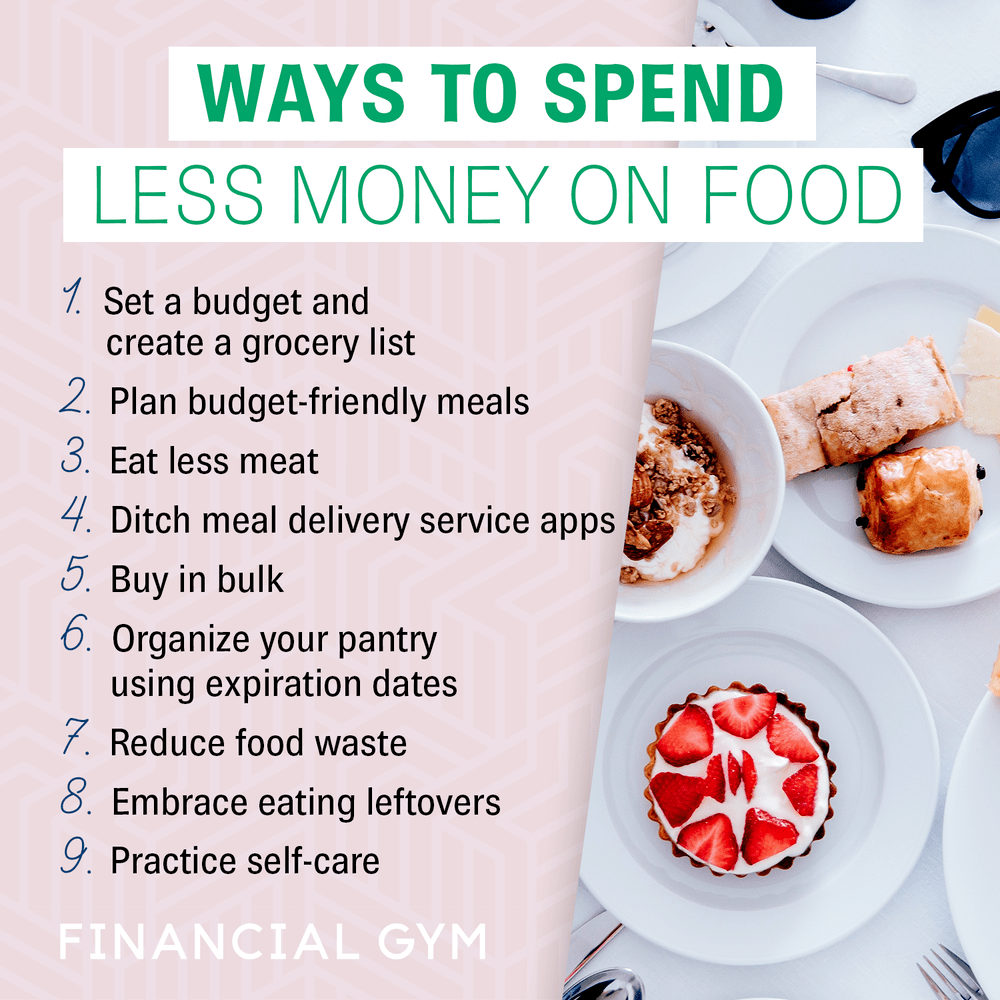9 Ways to Spend Less Money On Food
Every dollar counts when you’re trying to save money and keep your finances in order. Groceries are a significant line-item expense for every family’s household budget.
According to the Bureau of Labor Statistics, the average American consumer spent around $4,500 on groceries in 2018. Here’s how to save money on groceries without completely changing your lifestyle.
1. Set a budget and create a grocery list
Create a budget so you know exactly how much you can spend on groceries each week, or however often you prefer to shop. Then stick to it by making a detailed grocery list of any food or household items your family may need.
If you visit the grocery store without a plan, you’ll likely buy a lot more than you need and potentially more than you can responsibly afford.
2. Plan budget-friendly meals
One of the best ways to save money on groceries is to plan out your meals for each week ahead of time. This will help reduce food waste and give you a better game plan when it’s time to go grocery shopping.
You can also save money by building in budget-friendly meals, like having breakfast for dinner (i.e. breakfast casserole). There are tons of cheap meal ideas online that only require a few ingredients and can be made for the whole family to enjoy.
3. Eat less meat
Meat is one of the most expensive grocery categories. You can make a large dent in your grocery bill by cutting down on your meat consumption. One way to do this is to replace meat with vegetable alternatives.
Vegetables are usually cheaper and are easier to transform when preparing a dish. If your family is reluctant to go without meat, try incorporating Meatless Mondays each week to cut down your costs and introduce new meatless dishes.
4. Ditch meal delivery service apps
Although it’s convenient, meal delivery services can cost you a lot more than cooking at home or making the quick drive to go pick up the food yourself. Besides paying for the food itself, you usually have to pay a service charge, delivery fee and a tip for the driver — all of which adds up quickly, especially if you’re using it multiple times a week.
Save money by uninstalling all meal delivery apps on your phone and cancel any meal subscription plans.
5. Buy in bulk
You may be able to save on groceries by buying certain foods in bulk. Stores like Costco and Sam’s Club have quality options that allow you to save by buying a large quantity of one item all at once. For example, you can save quite a bit by buying canned goods or meat in bulk since canned goods have a long shelf life and meat can be frozen and used as needed throughout the month.
6. Organize your pantry using expiration dates
Unless you have the perfect pantry set-up, you’ve probably had to throw away food simply because you forgot it was stashed at the back of the pantry.
Organize your pantry by expiration date by placing food items that need to be eaten first at the front of the pantry. Then, you can incorporate those items into your meal plan for the week instead of losing money by throwing it out in a couple of months.
7. Reduce food waste
Throwing away food is like throwing away your money. Take steps to reduce your food waste by storing your groceries correctly. For example, it’s worth investing in good storage containers that are made specifically for the refrigerator and freezer if it extends the life of your food — and, therefore, saves you money.
Make sure you’re only buying produce that you can consume within a few days and learn how to properly store your fruits and vegetables. This means using your refrigerator’s crisper drawers to your advantage and knowing how long you have to safely consume the food.
8. Embrace eating leftovers
Leftovers are meals that keep on giving. Instead of tossing out your leftover food from dinner, plan to use it for your lunch the next day. Or get creative and make a new meal for dinner using just leftovers. You can dress up leftovers by adding different spices or reheating them in the oven or an air fryer instead using a microwave.
9. Practice self-care
This one may seem odd at first, but stick with us! Practicing self-care, like getting more sleep and figuring out ways to relax your mind, can save you money on food. When we’re stressed or tired, we often make decisions that are the easiest. In this case, we opt for fast food or takeout which can quickly drain your bank account. By focusing on your well-being, you can make better decisions when it comes to your health and your finances.
Using these small, simple ways to save money on your groceries can make a big impact on your budget.

